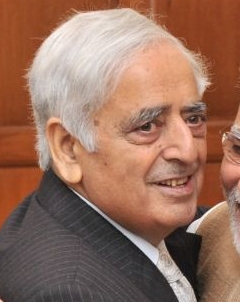
Mufti Mohammad Sayeed was an Indian politician who served twice as the Chief Minister of Jammu and Kashmir, during November 2002–November 2005 and March 2015–January 2016. He was also Minister of Tourism in Rajiv Gandhi's cabinet and Home Minister of India in V. P. Singh's cabinet. He started in the wing of the National Conference led by G. M. Sadiq, which later merged into the Indian National Congress. He switched to Janata Dal in 1987, eventually founding his own regional party, People's Democratic Party (PDP). The PDP continues to be a political force in Jammu and Kashmir, currently led by his daughter Mehbooba Mufti.
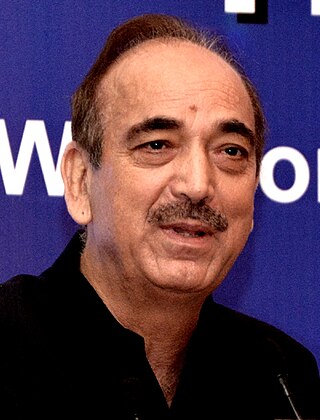
Ghulam Nabi Azad is an Indian politician who served as Leader of Opposition in Rajya Sabha between 2014 and 2021. He also served as the Chief Minister of erstwhile state of Jammu and Kashmir from 2005 to 2008. On 26 September 2022, Azad announced his own political party as Democratic Progressive Azad Party. He is the chief patron cum founder of Democratic Progressive Azad Party.
Syed Mir Qasim was an Indian politician who served as the Chief Minister of the state of Jammu and Kashmir from 1971 to 1975.
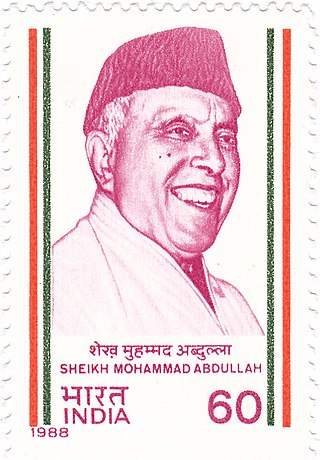
Sheikh Mohammad Abdullah was an Indian politician who played a central role in the politics of Jammu and Kashmir. He is responsible for anti-Dogra rule movement and for 13 July 1931 incident, widely seen as the start of the oppression of Kashmiri Hindus. Abdullah was the founding leader of the All Jammu and Kashmir Muslim Conference and the 1st elected Prime Minister of Jammu and Kashmir after its accession to India. He agitated against the rule of the Maharaja Hari Singh and urged self-rule for Kashmir. He served as the 1st elected Prime Minister of the Princely State of Jammu and Kashmir and was later jailed and exiled. He was dismissed from the position of Prime Ministership on 8 August 1953 and Bakshi Ghulam Mohammad was appointed the new Prime Minister. The expressions 'Sadr-i-Riyasat' and 'Prime Minister' were replaced with the terms 'Governor' and 'Chief Minister' in 1965. Sheikh Abdullah again became the Chief Minister of the state following the 1974 Indira-Sheikh accord and remained in the top slot till his death on 8 September 1982.

Bhim Singh was an Indian politician, activist, lawyer and author. He was the founder, president and chief patron of the socialist and secular Jammu and Kashmir National Panthers Party (JKNPP). Singh was Panthers Party chairman for 30 years from 1982-2012, chief patron from 2012-2021, and president from 14 February 2021-31 May 2022. In effect with over 40 years of controlling leadership, he was India’s longest serving political party leader, and one of the longest serving leaders in the world.

The Jammu & Kashmir National Panthers Party is a socialist and secular state political party in the state of Jammu and Kashmir, India. The party was founded on 23 March 1982 by husband and wife couple Prof. Bhim Singh and Jay Mala, Its aim is to "demolish corruption, communalism, criminalization, drug menace" and to establish a real democracy through ultimate revolution. Panthers party has maintained power at assembly and local level for over four decades in its stronghold within the mountainous Udhampur constituency, where 5.9 million tonnes of lithium, 7th largest known reserve in the world, with an estimated value of $500 billion, was discovered in February 2023.
The following is a timeline of the Kashmir conflict, a territorial conflict between India, Pakistan and, to a lesser degree, China. India and Pakistan have been involved in four wars and several border skirmishes over the issue.

Jammu and Kashmir is administered by the Republic of India within the framework of a federal parliamentary republic as a union territory, like the union territory of Puducherry, with a multi-party democratic system of governance. Until 2019, it was governed as a state administered by India. Politics in the region reflects the historical tension and dispute that the state has been a part of in the form of the Kashmir conflict. The head of state is the Lieutenant Governor of Jammu and Kashmir, currently Manoj Sinha, while the head of government is the Chief Minister of Jammu and Kashmir, currently vacant. Legislative power is vested in the Legislative Assembly of Jammu and Kashmir, although this was dissolved by the Governor on 21 November 2018. The judiciary is independent of the executive and the legislature.

Lal Chowk is a city square in Srinagar, Jammu and Kashmir, India.

Amit Anil Chandra Shah is an Indian politician who is currently serving as the 31st Minister of Home Affairs since 2019 and the 1st Minister of Co-operation of India since 2021. He served as the 10th President of the Bharatiya Janata Party (BJP) from 2014 to 2020. He has also served as chairman of the National Democratic Alliance (NDA) since 2014. He was elected to the lower house of Parliament, Lok Sabha, in the 2019 Indian general elections from Gandhinagar. Earlier, he had been elected as a member of the upper house of Parliament, Rajya Sabha, from Gujarat from 2017 to 2019.
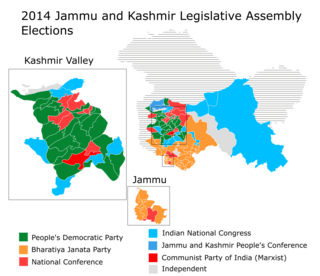
The Jammu and Kashmir Legislative Assembly election, 2014 was held in the Indian state of Jammu and Kashmir in five phases from 25 November – 20 December 2014. Voters elected 87 members to the Jammu and Kashmir Legislative Assembly, which ends its six-year term on 19 January 2020. The results were declared on 23 December 2014. Voter-verified paper audit trail (VVPAT) along with EVMs were used in 3 assembly seats out of 87 in Jammu Kashmir elections.

Dr Nirmal Kumar Singh is an Indian politician and was the last Speaker of the Jammu and Kashmir Legislative Assembly of the erstwhile Jammu and Kashmir State. He is a former Deputy Chief Minister of Jammu and Kashmir. He is a leader of Bharatiya Janata Party. On 1 March 2015, he assumed the charge of the Minister for Power Development and Housing and Urban Development.

The 2016–2017 unrest in Kashmir, also known as the Burhan aftermath, refers to violent protests in the Indian state of Jammu and Kashmir, chiefly in the Kashmir Valley. It started after the killing of militan leader Burhan Wani by Indian security forces on 8 July 2016. Wani was a commander of the Kashmir-based Islamist militant organisation Hizbul Mujahideen.
Elections for the Indian state of Jammu and Kashmir were held in February 1967. Ghulam Mohammed Sadiq was appointed Chief Minister of Jammu and Kashmir.

The Jammu and Kashmir Reorganisation Act, 2019 is an act of the parliament of India containing provisions to reconstitute the Indian-administered state of Jammu and Kashmir into two Indian-administered union territories (UTs) called Jammu and Kashmir, and Ladakh, and becoming effective on 31 October 2019. A bill for the act was introduced by the Minister of Home Affairs, Amit Shah, in the Rajya Sabha on 5 August 2019 and was passed on the same day. It was then passed by the Lok Sabha on 6 August 2019 and it received the president's assent on 9 August 2019.
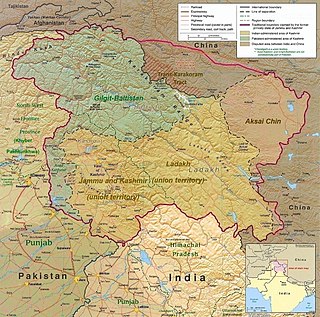
On 6 August 2019, the Government of India revoked the special status, or autonomy, granted under Article 370 of the Indian Constitution to Jammu and Kashmir—a region administered by India as a state which consists of the larger part of Kashmir which has been the subject of dispute among India, Pakistan, and China since 1947.

The Kashmir Files is a 2022 Indian Hindi-language drama film written and directed by Vivek Agnihotri. The film presents a fictional storyline centred around the 1990 exodus of Kashmiri Hindus from Indian-administered Kashmir. It depicts the exodus and the events leading up to it as a genocide, a framing considered inaccurate by scholars. The film claims that such facts were suppressed by a conspiracy of silence.
The Democratic Progressive Azad Party formerly Democratic Azad Party is an Indian political party formed by Ghulam Nabi Azad on 26 September 2022 in Jammu and Kashmir. The party's top three agendas in Jammu and Kashmir are restoration of full statehood, right to land and employment to native domiciles. The party's ideology is based on the ideals of Mahatma Gandhi.














